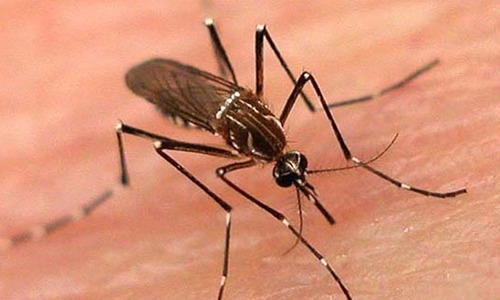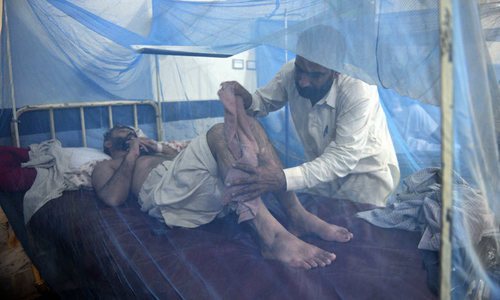PESHAWAR: The Khyber Pakhtunkhwa government has formally requested a Singapore-based facility to help it control mosquito population in the province for the prevention of the vector-borne disease.
“We [KP government] are in contact with the World Health Organisation Collaborating Centre for Dengue Management in Singapore through our country’s high commissioner for the introduction of a new biological method to reduce the population of mosquitoes, a major cause of dengue in the province,” PTI Senator Nauman Wazir told Dawn.
According to Sen Wazir, a resident of Peshawar, the initiative was launched at the request of the local scientists, who visited Singapore after the 2017 dengue outbreak, which killed over 70 people and affected 50,000 more.
He said that Brazil and Singapore had successfully implemented that method through Wolbachia-infected mosquitoes to significantly reduce mosquito population biologically.
Govt wants to introduce new method to prevent dengue outbreaks
The lawmaker said that the WHO’s Pakistan chapter was supporting the move and that a meeting would take place within a week to discuss the anti-dengue plan.
He said that the Pakistan Science Foundation of the federal science and technology ministry was collaborating with the provincial government for the purpose.
“Minister for Science and Technology Shibli Faraz is very active for the introduction of that biological method to prevent dengue outbreak, which occurs every year,” he said.
Senator Nauman said that the authorities in Singapore had assured the KP government’s representatives that they would carry out a training programme for the relevant staff members for the method’s successful launch and implementation and would help the local scientists set up the required infrastructure.
He, however, said that the Singapore authorities won’t give the provincial government the ‘vector’ (mosquito), which they had taken from the University of Michigan in the US.
The lawmaker said that he had also contacted a friend in a Washington university to help get that vector from the University of Michigan.
“Hopefully, we will be able to start the programme in a couple of months,” he said.
“We can establish infrastructure once we finalise arrangements with Singapore. Local scientists involved in anti-dengue campaigns are keen to have the system which has successfully been started in many countries,” he said.
Meanwhile, officials in the health department told Dawn that it was a one-time investment to create a full-fledged infrastructure for mosquito control as dengue had been claiming lives and affecting a large number of people every year.
They said not only dengue but other vector-borne diseases like yellow fever, Zika virus and chikungunya could be also prevented biologically once mosquito population was controlled.
The officials said the new method had successfully been used in many countries for reduction of mosquito population and thus, checking the vector-borne ailment on a sustainable basis.
Meanwhile, the dengue cases continue to fall after the advent of the winter season.
On Monday, the province recorded 11 more cases taking the total tally of its patients to 10,529.
Of the infected people, 10,496 have already recovered, while the number of active patients is 23, according to a health department report. The report said 10 people had died of dengue in the province in the year.
Published in Dawn, December 7th, 2021














































